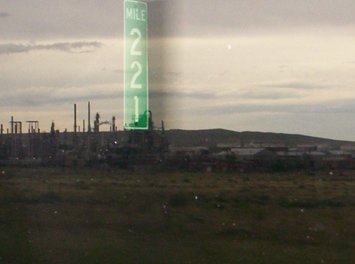 A view of Laramie, Wyoming on my road trip from 2005. A view of Laramie, Wyoming on my road trip from 2005. By Melissa When I mention the phrase "documentary theatre" to most people, they look at me a bit confused. I've found that this phrase even causes quizzical looks amongst my fellow theatre artists. I often try to describe it as "theatre based on real events" or even relating to people's knowledge of documentary film to start a conversation about it. Coming from a high school that had no formal theatre program and produced only one musical a year, I first encountered documentary theatre back in my junior year of college during a production of The Laramie Project by Moises Kaufman and the Tectonic Theater Project. The School of Performing Arts cast the show with both actors from our department and with non-actors from the campus community. The result was magic. It was a true community effort. As an actor, I was thrilled to be working with my fellow classmates who weren't performing arts majors, most of whom I had not met before, and many of whom were gay and had experienced firsthand the kind of discrimination explored in the play. We performed several nights of shows together, but more than that, we became friends, allies. I spent hours upon hours in the green room talking to each and every cast member, getting to know them as people, and when our lobby display was defaced on opening weekend with a number of unmentionable phrases and slurs, we found our newly formed friendship became a strong foundation upon which to build a plan for activism. We organized prayer circles, we chalked sidewalks on campus, we planned workshops, lectures, and other interactive events connected with the performances to raise awareness. When the lights came up at the end of the show, the play may have come to an end, but the conversations were just beginning. Getting to work with Moises Kaufman of Tectonic Theater Company (you can read more about his incredible work in the field of documentary theatre here) during a workshop he held for our cast was a rare and wonderful opportunity for me, and I remember being interviewed for the school newspaper at the time about his visit and the play. I was quoted as saying "I'd like to do this kind of theatre someday. It's innovative, and isn't that what theatre is supposed to be?" Looking back on this whole experience, I realize all over again what gift it was. It is my wish that everyone gets the chance to experience something as transforming as this was for me. I still feel this way. A decade later, and I've returned to these documentary theatre roots with this company of my own. For me, in the year 2015, I cannot imagine feeling stronger about a project than I do about this kind of work. We've always needed truth onstage, but now, more than ever, we need to wield performance as a tool for digging into the real stories of our fellow human beings and forging connection. Sinking down below the hum of the major media outlets, going deeper than mainstream offerings, until we get to the very floor of this ocean of human experience. Real human beings with real stories, straight from their hearts and mouths. I have had the privilege of talking to people all over the country, many people from my very own city of Boston itself. After you hear someone's story, it is impossible to look at the world through the same eyes. Riding the subway, chatting with a neighbor, even buying an iced tea from a Starbucks barista feels different. After a documentary theatre interview, I find that my belief in humanity is stronger, that my hope is renewed, that my faith in my community has grown. During this interview process, the world has expanded in ways I didn't know it could, feeling more beautiful and complicated than ever before. At the same time, the world feels smaller and more personal, too. The dozens of people we've talked with across the country now figure in my mind when I think of exactly who my "fellow Americans" are: a man from Egypt studying to be a dentist, a woman approaching her 70th birthday who says her proudest moment is yet to come, and an operating room nurse who believes that it is her mission to help and serve others. I feel grateful for their presence in the community at large, regardless of where in the country they live. I hope that you continue to follow the unfolding of these stories with us, and that if you are able to, you join us in the fall when we unveil this play. Just as The Laramie Project changed the landscape of my life, I hope our American Dream play will change you, too.
0 Comments
Your comment will be posted after it is approved.
Leave a Reply. |
ARCHIVES
July 2016
WHAT YOU'LL FIND HEREStory inspirations. Artist reflections. Community conversations. CATEGORIES |
|
Proudly powered by Weebly
|

 RSS Feed
RSS Feed
